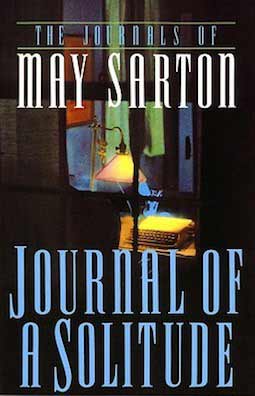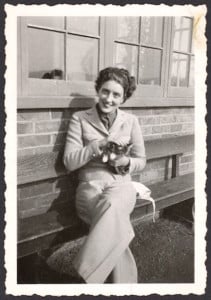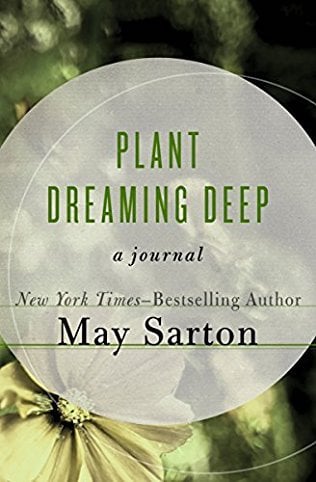Self-Searching Quotes from Journal of a Solitude by May Sarton
By Taylor Jasmine | On October 22, 2017 | Updated December 23, 2022 | Comments (0)

Journal of a Solitude by May Sarton is this multi-faceted writer’s 1973 follow-up to Plant Dreaming Deep, in which she continues her search for self.
Published in 1973, Journal of Solitude would later become a key text in women’s studies courses. Like her other books, both memoirs and novels, this one explores isolation, solitude, love, relationships, sexual orientation, success, failure, gratitude, love of nature, the seasons, and the struggles of a creative life.
Through her various journals, Sarton inspired readers to recognize the sweetness in purposeful solitude and its role in healing and reflection. She wrote: “Loneliness is the poverty of self; solitude is richness of self.”
Sarton deals with aging and illness in her later memoirs Recovering, At Seventy, At Eighty Two, and After the Stroke.
The following poignant passages and quotes from Journal of a Solitude illustrate her facing of buried emotions, as she seeks not so much answers, but dares to ask hard questions.
. . . . . . . . . .
“I hope to break through into the rough, rocky depths, to the matrix itself. There is violence there and anger never resolved. My need to be alone is balanced against my fear of what will happen when suddenly I enter the huge empty silence if I cannot find support there.”
. . . . . . . . .

Portrait of May Sarton by Polly Thayer Starr, 1937
. . . . . . . . . .
“I woke in tears this morning. I wonder whether it is possible at nearly sixty to change oneself radically. Can I learn to control resentment and hostility, the ambivalence, born somewhere far below the conscious level? If I cannot, I shall lose the person I love. There is nothing to be done but go ahead with life moment by moment and hour by hour — put out birdseed, tidy the rooms, try to create order and peace around me even if I cannot achieve it inside me.”
. . . . . . . . . .
“For a long time now, every meeting with another human being has been a collision. I feel too much, sense too much, am exhausted by the reverberations after even the simplest conversation. But the deep collision is and has been with my unregenerate, tormenting, and tormented self.
I have written every poem, every novel, for the same purpose — to find out what I think, to know where I stand. I am unable to become what I see. I feel like an inadequate machine, a machine that breaks down at crucial moments, grinds to a dreadful halt, ‘won’t go,’ or, even worse, explodes in some innocent person’s face.”
. . . . . . . . . .
See also: Journal of a Solitude by May Sarton
. . . . . . . . . .
“Cracking open the inner world again, writing even a couple of pages, threw me back into depression, not made easier by the weather, two gloomy days of darkness and rain. I was attacked by a storm of tears, those tears that appear to be related to frustration, to buried anger, and come upon me without warning.”
. . . . . . . . . .
“There is no doubt that solitude is a challenge and to maintain balance within it a precarious business. But I must not forget that, for me, being with people or even with one beloved person for any length of time without solitude is even worse. I lose my center. I feel dispersed, scattered, in pieces. I must have time alone in which to mull over my encounter, and to extract its juice, its essence, to understand what has really happened to me as a consequence of it.”
. . . . . . . . . .
“It is harder for women, perhaps to be ‘one-pointed,’ much harder for them to clear space around whatever it is they want to do beyond household chores and family life. Their lives are fragmented… the cry not so much for a ‘a room of one’s own’ as time of one’s own. Conflict become acute, whatever it may be about, when there is no margin left on any day in which to try at least to resolve it.”
. . . . . . . . . .
“It is a waste of time to see people who have only a social surface to show. I will make every effort to find out the real person, but if I can’t, then I am upset and cross. Time wasted is poison.”
. . . . . . . . . .
“When I speak of life and love as expanding with age, sex seems the least important thing. At any age we grow by the enlarging of consciousness, by learning a new language, or a new art or craft (gardening?) that implies a new way of looking at the universe.”
. . . . . . . . . .
You might also like: Now I Become Myself (poem) by May Sarton
. . . . . . . . . .
“Love is one of the great enlargers of the person because it requires us to ‘take in’ the stranger and to understand him, and to exercise restraint and tolerance as well as imagination to make the relationship work.”
. . . . . . . . . .
“The sheer vital energy of the Woolfs [Virginia and Leonard] always astonishes me when I stop to consider what they accomplished on any given day. Fragile she may have been, living on the edge of psychic disturbance, but think what she managed to do nonetheless — not only the novels (every one a breakthrough in form), but all those essays and reviews, all the work of the Hogarth Press, not only reading mss. and editing, but, at least at the start, packing the books to go out!
And besides all that, they lived such an intense social life. (When I went there for tea, they were always going out for dinner and often to a party later on.) The gaiety and the fun of it all, the huge sense of life! … And two houses to keep going! Who of us could accomplish what she did?”
. . . . . . . . . .
See also: Plant Dreaming Deep



Leave a Reply